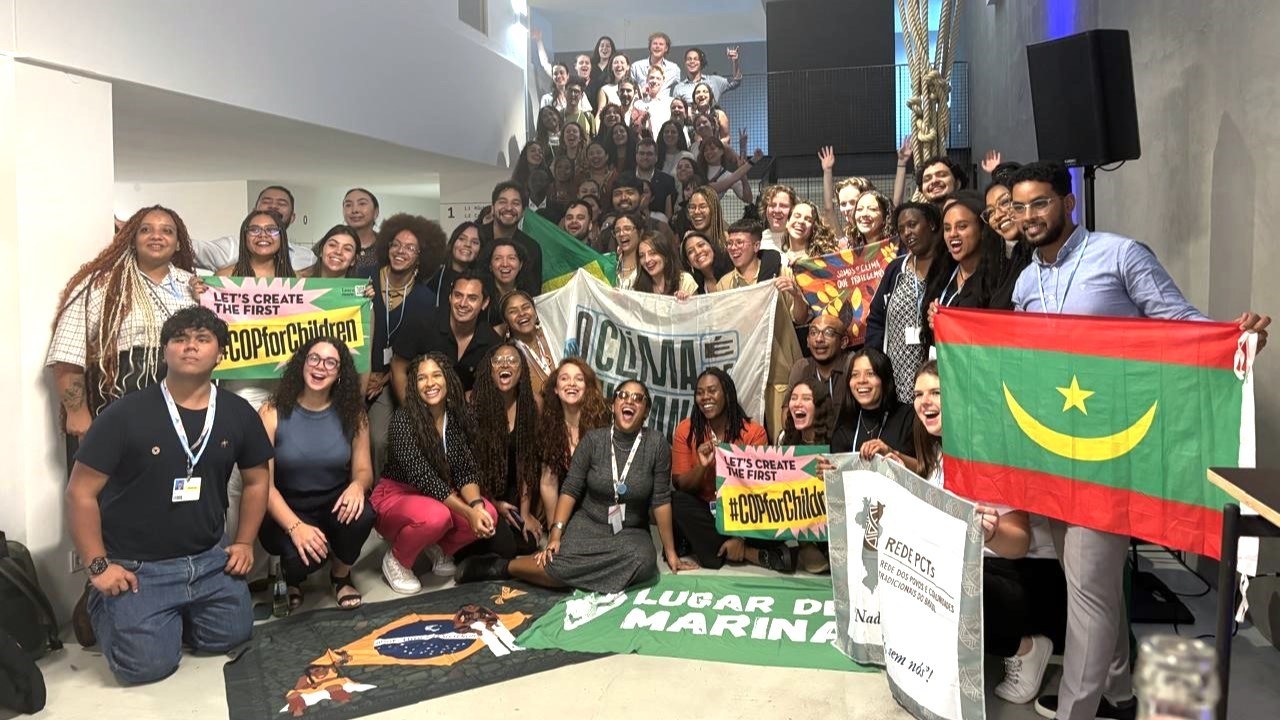Youth in Bonn demand meaningful inclusion in climate decisions: "We are ready"
COP30 Youth Climate Champion Marcele Oliveira, speaking at SB62, urged the urgent and effective inclusion of young people in Nationally Determined Contributions (NDCs). With only 23 countries having submitted new climate commitments, the Bonn meeting underscored the strategic importance of youth in reshaping global targets

Por Franciéli Barcellos de Moraes | COP30
Last November, when Brasil updated its Nationally Determined Contribution (NDC), it quietly marked a significant milestone: the document, for the first time, explicitly mentioned children and youth. Against this backdrop, COP30 CEO Ana Toni and climate champion Marcele Oliveira convened a meeting on Wednesday, June 18, in Bonn, Germany. They gathered young climate leaders from diverse nations to hear from and engage with this emerging generation, which is now demanding genuine participation in shaping policies that will define the world for decades.
A central theme of the discussion was the submission of NDCs by other countries, as these commitments remain the primary mechanism for nations to outline their targets and strategies for reducing national emissions and adapting to climate change impacts. As the world races to align its climate commitments with the 1.5 °C goal, young people are eager to transition from observers to active participants. The meeting was held as part of the 62nd session of the Subsidiary Bodies (SB62) of the United Nations Framework Convention on Climate Change (UNFCCC), a preparatory event for COP30.
"Brasil cannot act alone. This is a far broader struggle. So far, only 23 countries have submitted their new initiatives. We need others to follow this example — and do so urgently"
— MARCELE OLIVEIRA, COP30 Youth Climate Champion
“We need robust NDCs from all Parties, and that is why we are here: for an intergenerational conversation,” Oliveira emphasized. “Brasil cannot act alone. This is a far broader struggle. So far, only 23 countries have submitted their new initiatives. We need others to follow this example — and do so urgently.” She also voiced concern that climate plans are being devised without the input of those whose futures will be shaped by such decisions.
On behalf of the COP30 presidency, Ana Toni outlined Brasil’s efforts and encouraged sustained pressure from young people as a constructive catalyst for accelerating these processes. “Governments are also learning in this process,” she noted. “But one thing I can assure you: if there’s no pressure, it doesn’t work. And you, young people, are very good at that—pressuring us. That is critically important.” She also recalled her own beginnings in climate advocacy as a young person.
The meeting underscored that the call for youth leadership in climate policy is not new. However, recent years have witnessed the consolidation of a movement demanding more than symbolic representation: it now seeks structured participation, dedicated funding, and genuine decision-making authority.
“Engagement doesn’t just mean consultations and education — it also means ensuring that child-sensitive indicators are monitored in future NDCs,” stated Leyla Hasanova, climate champion of COP29 in Baku. She added, “The tools from the United Nations Children’s Fund (UNICEF), among others, offer excellent frameworks for this. The meaningful inclusion of children and youth is not merely a symbolic gesture. While we can discuss it extensively, in practice, it is a strategic necessity.”
This position emerged only in the past year—a testament to the success of youth movements. Beyond Leyla’s election in Azerbaijan, last year’s COP saw the launch of a regional youth delegate program. This initiative served as a crucial training ground for participants to grasp the processes of the United Nations Framework Convention on Climate Change (UNFCCC) and the intricacies of NDCs. The program encompassed national workshops in partnership with UNICEF and summer camps dedicated to the climate education of young educators, engaging representatives from over 30 countries.
Miriam Castillo, representing the International Indigenous Peoples’ Youth Forum on Climate Change (IIYFCC), underscored the diverse experiences within youth populations. She noted how specific groups—including Indigenous, rural, disabled, and those from marginalized contexts—continue to confront even more formidable barriers to participating in these debates, despite being disproportionately affected. Echoing her Azerbaijani counterpart, Miriam also advocated for the institutionalization of youth involvement in climate matters. “It is essential to establish permanent youth councils linked to NDC governance at the national and local levels,” she asserted, “as well as to promote youth leadership in climate policy by guaranteeing formal roles for young people in national climate consultations and as part of Party delegations in UNFCCC processes. This is key to enabling meaningful participation.”
A summary of the key recommendations raised:
Permanent and binding governance, with youth councils operating at both national and local levels.
Structured financing for youth-led climate action.
Accessible and translated materials, with language appropriate to different age groups and realities.
Ongoing, regionalized training, focused on capacity-building and climate literacy.
Intersectional inclusion, respecting the diversity of experiences among youth.
As COP30 approaches, the expectation is that youth will be integrated into every facet of the Conference: from heads of state speeches to technical panels and grassroots mobilization. For the young participants at Wednesday’s June 18 meeting, the message was unequivocal: if the climate crisis truly necessitates a 'whole-of-society' approach, as indicated in the latest UNFCCC global stocktake, then there is no longer space for decisions to be made unilaterally or without transparency. The youth, they affirmed, are ready.
English Version: Trad. Bárbara Menezes.
Proofreading by Enrique Villamil.
